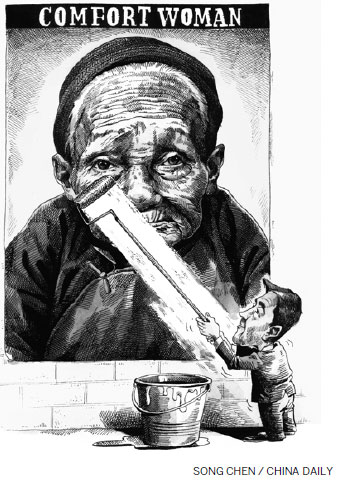War crimes catch Abe on the wrong foot
By Zhu Dongyang (China Daily) Updated: 2014-10-25 09:44

Japan's conflict with its Asian neighbors over the denial of its wartime atrocities escalated again after a high-ranking Japanese official denied on Oct 21 that the country's imperial army ran a sex slave racket during World War II.
Addressing a parliamentary committee, Japan's Chief Cabinet Secretary Yoshihide Suga denied that the imperial Japanese army abducted and enslaved more than 200,000 "comfort women" from Asian countries to "serve" in its military brothels during World War II.
Suga's remark goes against the 1993 acknowledgment of such crimes by the Japanese government. It is a renewed attempt by the current administration to whitewash one of Japan's most heinous war crimes, and echoes the rhetoric resorted to by Japan's nationalist politicians and media tycoons in a bid to revise the country's pacifist Constitution.
Led by Japanese Prime Minister Shinzo Abe, the grandson of a pardoned war criminal, Tokyo has spared no effort in reinterpreting its criminal wartime history. This attempt is reflected in three Japanese Cabinet ministers' visit to Yasukuni Shrine, which honors 14 Class-A war criminals among others, on Oct 18, one day after Abe sent a ritual offering to the notorious shrine.
Despite the cold relations with its Asian neighbors that suffered untold atrocities and gigantic economic losses under Japanese occupation, Tokyo has not given any sign of atoning for its wartime crimes. This exposes the hypocrisy of the island country's current rulers who claim to be the guardian of regional peace and friendship. This also exposes Japan's attempt to foment trouble in East Asia to cash in on the resultant chaos.
Suga's remark could not have been more besotted, as Abe has attempted to meet with Chinese and South Korean leaders. Apart from negating most of Abe's attempts to hold talks with leaders of neighboring countries, the Abe regime's blatant denial of Japan's historical crimes has also dealt a severe blow to its foreign trade, which has already been suffering from a downturn for 20 years.
If he continues to indulge in such nefarious attempts, Abe will definitely become persona non grata at formal and informal regional and global meetings such as the Asia-Pacific Economic Cooperation meeting in Beijing in November. Also, his efforts to meet with regional and world leaders will draw a blank.
The Japanese people and authorities should weigh in all these consequences before allowing the Abe government to continue denying the country's criminal past.
The response to the call of justice should not be seen as an attempt to interfere in Japan's internal affairs. Asian countries' appeal to honor the verdict of history is the natural call of justice. And only by heeding to the call of justice can countries lay the foundation of sustained regional peace and development.
The author is a writer with Xinhua News Agency.











